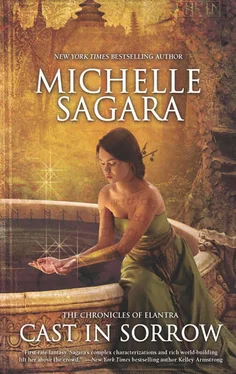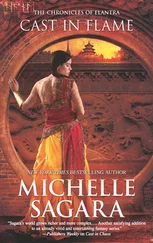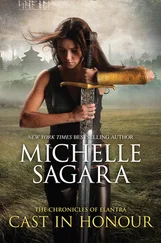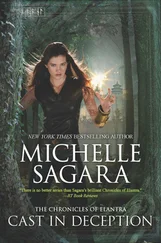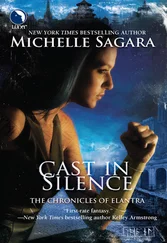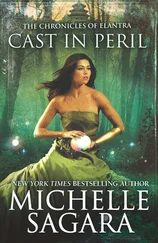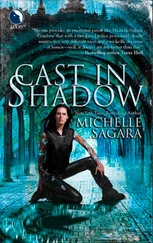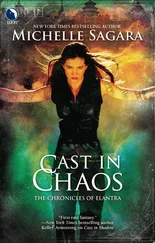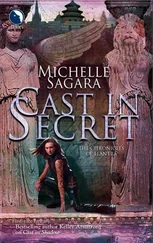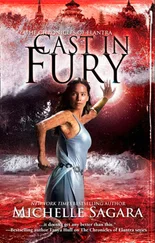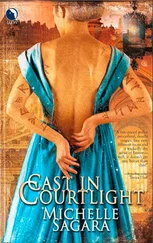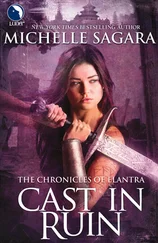Maybe Kaylin told this story first because it was about Teela. Maybe she told it because she, too, had lost her mother, and she wanted to believe—oh, all children wanted to believe—that if she were to be abandoned, it would be for reasons as perfect and clear as this one.
And maybe she told it because, as she began to speak, she could see Vivienne in the heart of the green.
Kaylin wasn’t Teela. Vivienne was not her mother. But she was certain that she would have known this woman anywhere. She looked like Teela. Not in the way that all Barrani women, except the Consort, did, although she had all the racial characteristics of her race: the long, dark hair, the slender build, the high cheekbones, and, at this moment, eyes of midnight-blue. No, it was in the shape of her face, the length of earlobes, the way her chin tapered to a sharper point.
If Teela had been run through by multiple blades, she would have looked like this.
Her eyes were on her daughter’s face.
Teela had climbed down from the fountain, somehow. Whatever she’d been holding at bay was forgotten. Her mother knelt by the fountain, and in the distance, Kaylin could hear the shouts and the cries of fighting; she could hear swords against swords, and harsh Barrani orders.
She could hear the prayers of the Warden. She hadn’t expected that; she couldn’t see him. Nor could she see the other combatants; not until they fell. Their dying bodies came into view as they did; they were close, so close, to Vivienne.
Kaylin reached for Teela, and then let her hand fall. She couldn’t call her back; she couldn’t stem the flow of words because she understood that it was her words that had built this image, that had made this history real.
And as Teela walked onto the green—a green that contained no Warden, no Ynpharion, no Severn—they joined her. Kaylin watched as they appeared, translucent at first, but gaining in solidity as she spoke. The eleven children. Some of their names, she knew. Some, she hadn’t heard until this moment.
Sedarias came first. She looked so proud, so aloof, so arrogant. She glanced at the bodies of the dead and the dying without so much as blinking; she stood above them all. But when she looked at Teela, she froze for one arrested moment, her eyes—her blue, cold eyes, shifting in that second to a very rare amethyst. Like Kaylin, she lifted a hand; like Kaylin, she let it drop.
But she turned to Kaylin, her eyes wide, her lips parted as if to speak. Then she smiled and turned away. It was a very Barrani smile.
Annarion came next, seconds behind. He was much like Sedarias—cold and proud of bearing. But what she would not do, he did; he saw the dying Vivienne, and his gaze went immediately to her daughter. He walked over the fallen, pausing only once to touch the side of a man’s neck before he rose again and made his way to Teela’s side.
Eddorian followed. His eyes were almost instantly the same shade of purple that Sedarias’s had taken, but on his face, with his drawn expression, it looked natural. He didn’t approach Teela; to Kaylin’s surprise, he offered Sedarias—a woman who almost certainly would take insult at the implication that she needed support—an arm. And she took it.
Allaron followed. He was, as she remembered him, a giant of a Barrani, and although he had the natural grace of his kin, he seemed to slouch a bit more; he had always been self-conscious about his size; he had always been pushed to excel in acts of physical prowess.
And he had. But significantly, it was Allaron who cried. He didn’t weep; Kaylin had never seen Barrani weep. His eyes were an open amethyst. A Barrani man put a hand on Allaron’s shoulder, and Allaron turned, looking down; he met the eyes of Valliant—who, like any mortal child of Kaylin’s acquaintance, loathed his name. Allaron was one of the few, even among the twelve, who failed to tease him for it.
Terrano, however, had teased him without hesitation. He was mischievous, but he could laugh at himself—which was unusual for a child, and even more unusual for Barrani. He came to Allaron’s left. There was no sparkle, no joke, no witticism; he was drawn and pale. He wanted to go to Teela. He couldn’t.
Not counting Teela, six of the lost had arrived. The seventh was a woman, called Serralyn. She wore her hair in unusual braids that framed her face and made her look older. Had she been motionless, her expression would have matched Sedarias’s; she wasn’t. Even standing, her hands moved; her feet tapped the ground. She looked as if she could burst into motion at any moment.
At this one, she was looking at Teela’s profile, at Teela’s dying mother, and hugging her arms to herself; she opened her mouth to speak, closed it, took two steps forward, and then a step back. Kaylin felt a pang of sympathy: no one who wanted all their teeth offered Teela open sympathy. Ever.
But...Serralyn had known Teela before she’d become a Hawk. Maybe, in the old days, she’d been different. Judging from Serralyn’s growing distress, probably not.
Torrisant appeared—and the first thing he did was straighten his clothing, which, to Kaylin’s eye, was already perfect. He lifted a hand, raising two flat fingers, and a bird—a bird that had been no part of Kaylin’s conscious telling—landed on them, warbling.
Fallessian appeared just in time to kick him; the bird squawked in outrage and flew, tiny claws extended, toward Fallessian’s perfect face. He laughed and fended it off with his hand—taking care not to actually connect with the little ball of fury. He didn’t speak—none of them had—but the look he turned on Torrisant clearly said, “Now is not the time.”
The tenth of the children appeared then, eleven if one included Teela. He looked no younger than any of the rest; to Kaylin, even now, children was the wrong word to describe them. But Karian was grimmer and more controlled than any of the others except Sedarias; he didn’t have the obvious arrogance of the young Annarion, but there was something about him that suggested, strongly, that his arrogance was a wall that couldn’t be breached, climbed, or otherwise opened.
He walked, with purpose, toward Teela.
No, Kaylin thought, toward her mother. But he paused, a frown creasing his forehead, not his lips. He turned to Sedarias and Annarion, and then, when they failed to give him the answers he had pretty clearly demanded, turned to the green, to the clearing, and...to Kaylin.
To the harmoniste.
There were eleven children; Teela was at the center. Kaylin knew their names. She knew their personalities. She knew some of their history, although the creature had devoured their edges because she wasn’t quick enough or strong enough to see the whole of their shape and importance before they had passed her by.
She knew that the twelfth had not yet arrived. Some part of her knew that this was history, and some part of her knew that it was more. Regardless, Mandoran had failed to arrive in the heart of the green—and they were waiting for him. Just as, she realized, they had waited so many centuries for Teela.
Her arms were shaking; she felt, as she lifted them, that she’d spent the afternoon doing nothing but heavy lifting with no breaks, although she didn’t realize it until she lifted her left hand. She opened her palm. The rune in its center was Mandoran’s name. Teela had said as much in some other country, at some other time.
Bloodred, wet, it had the shape and the texture of a True Word. She held it now. She had taken it to protect it. She had taken it to preserve it. But while she held it, Mandoran couldn’t join the rest. She looked at the name. Mandoran’s thread, Mandoran’s history, was part of the tapestry three people were weaving, and if she couldn’t find his thread, her part would falter. She wasn’t certain what would happen then.
Читать дальше
Конец ознакомительного отрывка
Купить книгу
